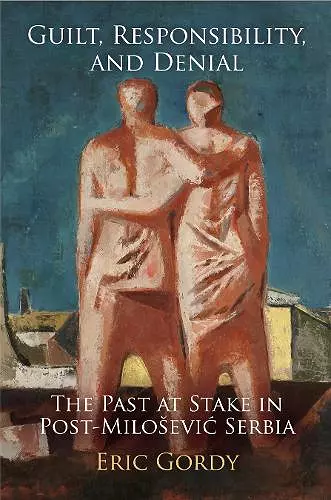Guilt, Responsibility, and Denial
The Past at Stake in Post-Milošević Serbia
Format:Hardback
Publisher:University of Pennsylvania Press
Published:30th Aug '13
Currently unavailable, and unfortunately no date known when it will be back

In one of the first studies to look at how the Yugoslav wars are understood in Serbian culture, Eric Gordy examines the legacy that confronted the country when Slobodan Milošević was forced out of power in 2000, assessing where transitional justice has achieved its goals, where it has not, and why it matters.
In one of the first studies to look at how the Yugoslav wars are understood in Serbian culture, Eric Gordy examines the legacy that confronted the country when Slobodan Milosevic was forced out of power in 2000, assessing where transitional justice has achieved its goals, where it has not, and why it matters.
When the regime led by Slobodan Milošević came to an end in October 2000, expectations for social transformation in Serbia and the rest of the Balkans were high. The international community declared that an era of human rights had begun, while domestic actors hoped that the conditions that had made a violent dictatorship possible could be eliminated. More than a decade after the International Criminal Tribunal for the Former Yugoslavia initiated the process of bringing violators of international humanitarian law to justice, significant legal precedents and facts have been established, yet considerable gaps in the historical record, along with denial and disagreements, continue to exist in the public memory of the Yugoslav wars.
Guilt, Responsibility, and Denial sets out to trace the political, social, and moral challenges that Serbia faced from 2000 onward, offering an empirically rich and theoretically broad account of what was demanded of the country's citizens as well its political leadership—and how these challenges were alternately confronted and ignored. Eric Gordy makes extensive use of Serbian media to capture the internal debate surrounding the legacy of the country's war crimes, providing one of the first studies to examine international institutional efforts to build a set of public memories alongside domestic Serbian political reaction. By combining news accounts, courtroom transcripts, online discussions, and his own field research, Gordy explores how the conflicts and crimes that were committed under Milošević came to be understood by the people of Serbia and, more broadly, how projects of transitional justice affect the ways society faces issues of guilt and responsibility. In charting the legal, political, and cultural forces that shape public memory, Guilt, Responsibility, and Denial promises to become a standard resource for studies of Serbia as well as the workings of international and domestic justice in dealing with the aftermath of war crimes.
"Gordy zeroes in on how Serbs have (or have not) come to terms with the war crimes and crimes against humanity committed by their leaders and prosecuted before the International Criminal Tribunal for the former Yugoslavia. Judging the Serbian public mind is not easy. Gordy, by going beyond merely examining the legal dramas and public opinion polls, discovered that most Serbs see the issues of guilt and responsibility in wavering shades, not stark colors. The Serbian people, he concludes, have come a good distance. But denialism lingers. . . . Gordy delivers his judgment of all the parties with sensitivity and compassion." * Foreign Affairs *
"This book is required reading for scholars engaging with social aspects of transitional justice, as well as anyone trying to understand Serbian political culture. . . . Gordy's approach is methodologically innovative." * Political Studies Review *
"A much needed and original contribution. Gordy provides a richness and depth that not only contextualizes but also shines a light on the way the international aspect of the issue of justice affects and is affected by cultural and societal factors." * Chip Gagnon, author of The Myth of Ethnic War: Serbia and Croatia in the 1990s *
"Hands-down the best book on political memory and responsibility in the Balkans. No one has read the domestic press as closely; Gordy does not essentialize the field of public memory but rather looks for disagreement and diversity." * Julie Mertus, American University *
ISBN: 9780812245356
Dimensions: unknown
Weight: unknown
272 pages